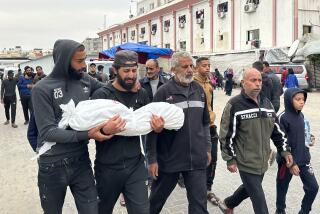Rwanda Refugees Get Reprieve From Violent Expulsions
- Share via
GOMA, Zaire — At dawn, families by the hundreds rolled up their bed mats, folded their plastic tents, scraped the last of the morning cornmeal from their pots and moved to the road. Word spread among ever-growing numbers of Rwandan refugees: It was time to go home, finally.
Then, on the roadside, they sat. All Thursday long. It was a brilliant day with sunshine and soft African breezes. But none of the refugees moved farther.
To their surprise--and almost everyone else’s--no soldiers came to march them onto trucks. There were no trucks. No U.N. officials were there to invite them onto buses. There were no buses.
Once again, Rwanda’s refugees found themselves pawns in the tortured politics of Central Africa. The issue was not whether they should go home. The United Nations has been trying to coax them back to Rwanda for months. The world community has said it can no longer pay $700 million a year to feed and care for them. The government of Rwanda has been urging them home. And Zaire, weary of accommodating more than 1 million refugees for 14 months now, mobilized its army this week to begin forcing an estimated 15,000 of them across the border.
As a result of Zaire’s get-tough action, it seemed there was a breakthrough in the long and dangerous refugee deadlock in this region. But the momentum was interrupted as the United Nations, the government of Zaire and diplomats argued Thursday, not over the repatriation, but over its terms.
The United Nations held out for principle: Refugees should not be expelled at gunpoint. Zaire--a vast, lawless country with well-deserved self-consciousness about its international image--relented and withdrew its troops, agreeing to discuss the matter.
By day’s end, an agreement seemed to be in the offing for Zaire to hold its soldiers back and for the United Nations to take over. Reuters news service reported that U.N. trucks would start taking refugees home today. Instead of forced expulsion, the refugees would be allowed to go home voluntarily. U.N. officials said they had the capacity to truck 5,000 people a day to Rwanda.
Still, on Thursday, the refugees sat along the road, bewildered.
Some relief workers threw up their hands. A golden moment had arrived. The powerful groupthink that governs so much of refugee life appeared to be shifting.
Last week, as for the past year, the vast mass of refugees held a single unifying belief. They could not go home. They are Hutus. Among them are powerful, ruthless extremists guilty of the mass murders of rival Tutsis in 1994. The murderers could not go home because Tutsis now control Rwanda and are demanding justice. And the extremists decreed that no one else could leave Zaire, either. The refugees were their shield and their claim to legitimacy as a government in exile.
But Zairian soldiers, with a fearsome reputation, moved into the camps this week to begin expulsions. This scared off the extremists. Suddenly, the innocent felt free to reconsider their future. A few hundred volunteered Wednesday to be “forced” home. Three times that number began to move to the road Thursday.
“People who are poor and innocent want to go home. The U.N. has to act swiftly, to act now, to get them moving and keep the momentum,” said Samantha Bolton of Doctors Without Borders, a non-governmental international relief group.
She and other relief officials worried that the deadlock over the refugees could resume just as soon as Hutu extremists felt safe returning to the camps.
Indeed, by Thursday afternoon, with the retreat of the Zairian army, young Hutu men with brawny arms and hard eyes could be seen again roaming the refugee camps of Goma. They surrounded--and surely intimidated--any refugees who dared speak to journalists. By all appearances, these were the very extremists who have long frustrated reconciliation among the Rwandans.
For their part, U.N. officials insisted that Zaire’s brief, gunpoint expulsions “broke the back” of the extremists who controlled the camps. Now, the United Nations reasoned, the refugees can return home in orderly fashion. “We now understand there is a considerable desire among the refugees to go back,” said Chris Bowers, spokesman for the U.N. refugee agency. “I don’t think the refugees are going to change their minds.”
More to Read
Sign up for Essential California
The most important California stories and recommendations in your inbox every morning.
You may occasionally receive promotional content from the Los Angeles Times.













